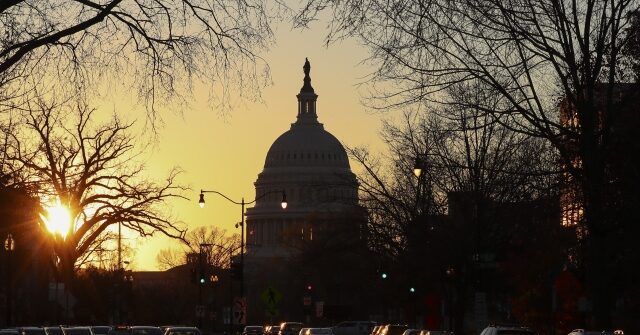

Update: After the publication of this story, House Majority Leader Steny Hoyer announced the House will vote on the omnibus package on Friday:
Congress is bracing for a long, cold winter night in Washington, DC, as outgoing House Speaker Nancy Pelosi (D-CA) is determined to pass the Democrats’ $1.7 trillion omnibus spending plan before lawmakers leave town for Christmas.
As the nation braces for a winter storm that is expected to bring freezing temperatures to a large portion of the United States, Pelosi is hopeful that the bloated spending bill will be passed on Thursday night following its passage in the Senate earlier in the day.
Per Punchbowl News, Pelosi explained that the 4,155-page, $1.7 trillion omnibus spending bill will take a few hours to pass through the Senate and be sent to the House, where it will then take an hour to get through rules and at least two additional hours to be debated on the floor.
Punchbowl’s Jake Sherman acknowledged it will be a long night if the House tries to pass the bill before lawmakers leave town.
Pelosi notes that it will take a few hours after the senate passes to get the bill to the house. Then 1 hours before rule. 2+ hours on the floor. It will be a long night. https://t.co/Zuc5du0uJh
— Jake Sherman (@JakeSherman) December 22, 2022
On Thursday morning, former President Donald Trump — who has already declared he is running for president — said in a video that everyone should “vote no” on the “ludicrous, unacceptable” omnibus bill that is “crammed with left-wing disasters, Washington betrayals, and special interest sellouts.”
“Every single Republican should vote no on the ludicrous, unacceptable $1.7 trillion omnibus spending bill. It’s a disaster for our country. And it also happens to be a disaster for the Republican Party because they can stop it,” Trump argued in his video released on Truth Social.
The massive $1.7 trillion omnibus spending bill, which would fund the government through September 2023, is likely to be the last piece of legislation to receive a vote in this Congress. In January, when Congress comes back in session, the Republicans will have taken control of the House, which will make it harder for Democrats to pass significant legislation.
Additionally, the bill is riddled with thousands of earmarks — with one report claiming they total $16 billion — which lawmakers add to bills to advance their own narrow political ends. The Congressional Research Service defines earmarks as spending provisions that are included in bills to benefit “a specific entity or state, locality, or congressional district other than through a statutory or administrative formula or competitive award process.”
Ultimately, they allow lawmakers to put “pork” in bills to fund projects in their districts — which could also be used to reward their donors and special interests.
Jacob Bliss is a reporter for Breitbart News. Write to him at [email protected] or follow him on Twitter @JacobMBliss.





